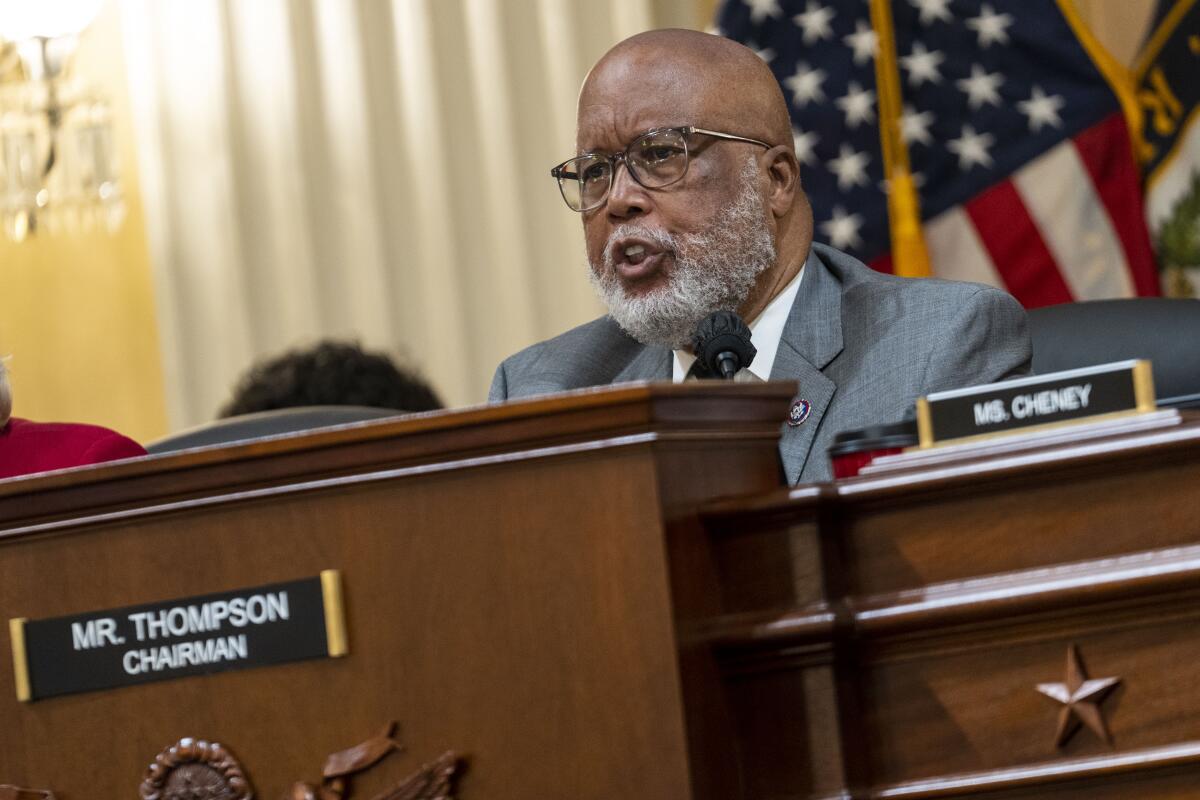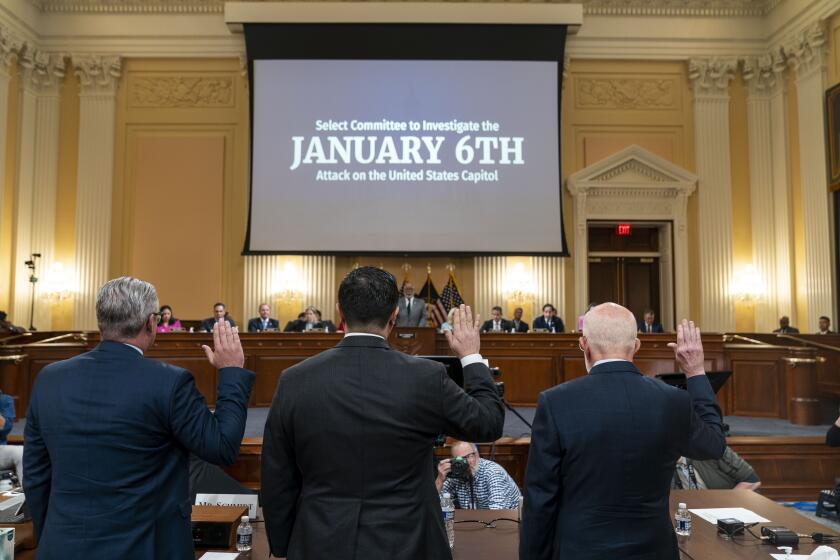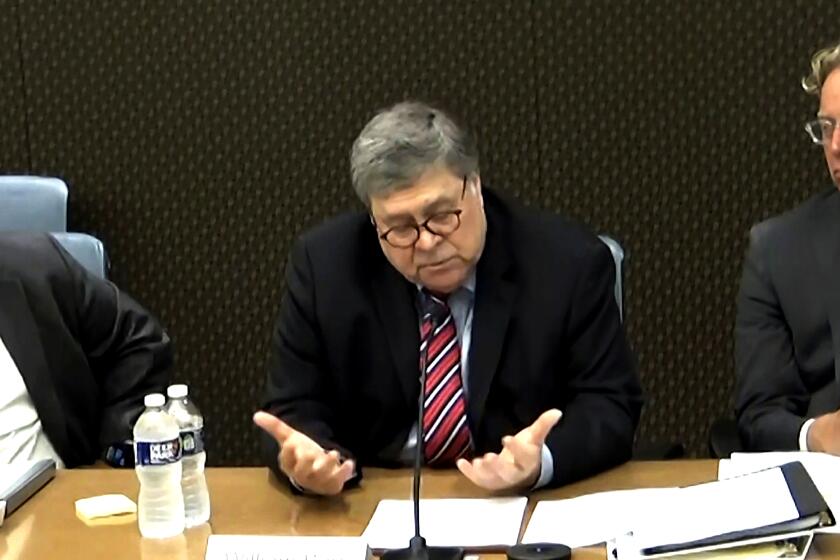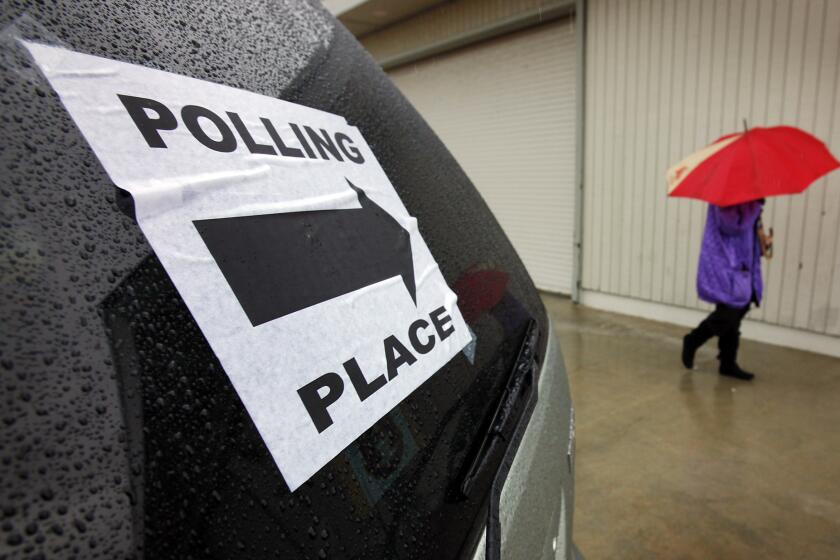Key takeaways from the second hearing on the Jan. 6 insurrection

The House Select Committee, tasked with investigating the root causes of the Jan. 6 Capitol insurrection, on Monday morning held its second televised public hearing and detailed how former President Trump knowingly lied about voter fraud claims in the 2020 election.
The hearing expanded on what the panel presented last week during the first public hearing, while some new light was shed on the inner workings of the Trump campaign as the former president pushed the false voter fraud narrative.
Here’s what you need to know:
An allegedly drunk Giuliani urged Trump to push fraud claims on election night
Before the election was called, former New York City Mayor Rudolph W. Giuliani urged Trump to declare himself the victor and push unsubstantiated allegations of voter fraud, according to a video testimony from former Trump aide Jason Miller.
Miller told the House Select committee that Giuliani, who was “definitely intoxicated,” was Trump’s only campaign advisor that night pushing the then-president to that position ahead of official results.
“Effectively, Mayor Giuliani was saying, ‘We won it. They’re stealing it from us. Where did all the votes come from? We need to go say that we won.’ And essentially that anyone who didn’t agree with that position was being weak,” Miller testified.
Allegations that Giuliani was intoxicated on election night were first mentioned by committee Vice Chair Rep. Liz Cheney (R-Wyo.) earlier in the hearing, prompting an audible gasp from the audience in the Cannon caucus room.
Trump ditched team members who wouldn’t back false voter fraud claims
In the aftermath of the 2020 election, Trump’s team repeatedly told him that allegations of widespread voter fraud were untrue. A frustrated Trump ignored them and replaced his legal team with people who would validate his positions.
“The general consensus was that law firms were not comfortable making the arguments that [Trump’s personal attorney] Rudy Giuliani was making publicly,” said Matthew Morgan, a former Trump campaign lawyer.
Former Trump campaign manager Bill Stepien, who was slated to be an in-person witness Monday but was unable to appear after his wife went into labor, said during a video deposition earlier this year that he became dissatisfied with the campaign’s new direction and said he “didn’t think what was happening was necessarily honest or professional at the time.”
Stepien said he and his team effectively became “Team Normal” as Giuliani and Trump attorney Sidney Powell amplified the voter fraud lies. Stepien did not mind the characterization, he said.
The committee held its second hearing Monday, which focused on Trump’s refusal to let go of election fraud claims, despite being told he had lost the election.
Trump raised $250 million off the ‘Stop the Steal’ campaign
The House Select Committee detailed an effort in which the Trump campaign used false voter fraud claims to raise hundreds of millions from small donors and redirected the money to organizations close to the former president.
“Not only was there the Big Lie, there was the big rip-off,” said Rep. Zoe Lofgren (D-San Jose), who helped lead the presentation at Monday’s hearing.
In a previously recorded video, Amanda Wick, senior investigative counsel to the House Select Committee, said the evidence presented “highlights how the Trump campaign aggressively pushed false election claims to fundraise — telling supporters it would be used to fight voter fraud that did not exist.”
Between the November election in 2020 and Jan. 6, 2021, the Trump campaign sent millions of fundraising emails to his supporters — sometimes as many as 25 a day — spreading falsehoods about voter fraud and urging recipients to “step up” and “fight back” against the “left-wing mob.”
The effort yielded the Trump campaign over $250 million — in just the first week following the election, they raised $100 million, Wick said.
The emails, primarily sent to “small-dollar donors,” urged donations to Trump’s “official election defense fund,” which did not exist.
The House Select Committee played audio from previously recorded interviews with Trump campaign staffers who said the naming of the fund was for marketing purposes.
The bulk money instead went to the “Save America PAC,” which donated millions to pro-Trump groups.
The Conservative Partnership Institution, Chief of Staff Mark Meadows’ foundation, and the American First Police Institution, which employs former Trump officials, each received $1 million. Event Strageties Inc., which ran Trump’s rally on Jan. 6, received $5 million, while the Trump Hotel Collection received $204, 857.
The money largely did not go toward campaign litigation, Wick said. The Capitol was breached half an hour after the final fundraising email was sent on Jan. 6, 2021.
“Donors deserve to know where their funds are really going,” Lofgren said. “They deserve better than what President Trump and his team did.”
Barr told Trump voter fraud claims were ‘bogus’
As the fallout of his election loss continued, Trump became “detached from reality,” former Atty. Gen. Bill Barr told the Jan. 6 House Select Committee.
In a previously recorded video deposition, Barr recounted his perspective on the manufactured voter fraud campaign from election night until he resigned from the administration in mid-December. He told the committee that he met three times with the then-president at the White House, telling Trump repeatedly that what his campaign aides were saying publicly did not have merit. Barr said Trump gave no indication throughout that period that he was interested in facts.
Former AG Barr told the Jan. 6 panel of an “avalanche” of voter fraud claims that “were completely bogus and silly and usually complete misinformation.”
The former attorney general said that before the election, “it was possible to talk sense to the president.”
“While you sometimes had to engage in a wrestling match with him, it was possible to keep things on track,” Barr said. “But I felt after the election he didn’t seem to be listening.”
So he resigned.
“My opinion then and my opinion now is that the election was not stolen by fraud,” Barr said. “I haven’t seen anything since the election that changes my mind on that.”
Times staff writers Anumita Kaur and Jennifer Haberkorn contributed to this report.
More to Read
Get the L.A. Times Politics newsletter
Deeply reported insights into legislation, politics and policy from Sacramento, Washington and beyond. In your inbox three times per week.
You may occasionally receive promotional content from the Los Angeles Times.













